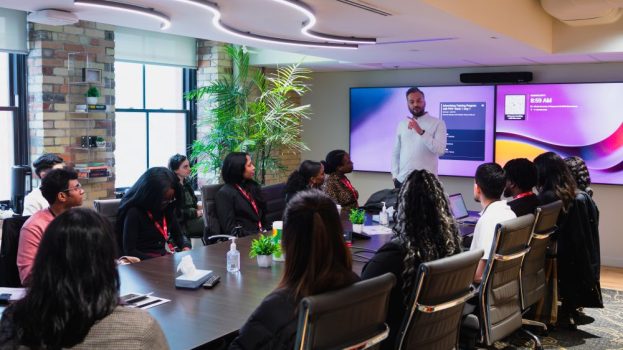
By Bunmi Adeoye
It’s been nine months.
2021 has been plopped, wailing into our arms, raw, disoriented and fresh as a newborn, nine months after George Floyd was murdered before our eyes.
Nine months of collective racial and Black Lives Matter uprising that prompted new discussions about how systemic racism has also seeped into our careers and the companies we work for. Nine months since many, many organizations put up black squares, “listened and learned” and made solidarity statements. Nine months where many Black professionals received awkward apologies from white and non-Black friends, colleagues, bosses – long-lost and current. Nine months of varying levels of D&I commitments from sole-proprietorships to multi-nationals alike. And, in recent days, we’ve witnessed the chaotic energy of 2020 hurtle into the early days of 2021.
In the last quarter of 2020, Pull Up for Change, an organization created for brands to self-report the number of Black people employed at the corporate and executive level,released the results of an online poll that showed 79% were dissatisfied with their company’s response to the call for racial inclusion. But what’s more, 73% were not optimistic about the future based on their company’s actions, and 69% saw a drop in momentum around diversity efforts within their company since they were started in June.
As a Black woman, these findings are disheartening and unsurprising. That’s partially because the space between where we are and where we need to be is huge, but also because past action (or inaction) has been, frankly, shameful. Any time these issues came up in the past, we pushed them under a rug and stood on top until the molehill until it grew into a mountain.
In July, myself and the other co-founders of Code Black Communicator Network created a manifesto to eradicate anti-Black racism in the communications industry. Our goal was to name the issues that Black communicators face and provide clear action points for our industry to adopt.
The manifesto outlines a number of action items, including mandating anti-bias training, actively seeking out and supporting media outlets that serve the Black community, prioritizing diversity in recruitment and diligence in creating internship opportunities for Black talent.
But perhaps the most vital action was acknowledging that anti-Black racism is real and systemic racism is experienced by Black people in a very specific way.
That’s because specific problems require specific solutions. A lot of the issues Black people experience in the workplace amount to a lifetime of unaddressed trauma: insinuations of affirmative action that begin in schools, well before we enter the workplace. Once we get there, the briefs, mockups, creative, and influencer lists include no Black people, even after we hear the fallacy that “things are way better in Canada.” We push through workdays despite yet another Black murder being committed and justice denied to the Black community, taking time to think about opportunities you missed out on because of the colour of your skin – or dent your own self-esteem by questioning which well-earned achievements came because of it.
And then, after all of that, we have the Black experience lumped in with the collective BIPOC experience, even though it is broad and varied. As companies grapple with their own corporate racial reckonings, mandates and narratives, it won’t be the first or the last time that a Black person will have to navigate and be gaslit by all of the above and then some.
So, how will corporations make Black Lives Matter in 2021? Clumsily, awkwardly, steadfastly, humbly, and by any means necessary. There is no time for hand-wringing.
The “how” will be in the doing, be they small acts or transformational. It will be speaking up again and again and asking better questions – of not only our colleagues, but also of ourselves and questioning our assumptions. Examining who is at the table and why. Challenging structures, institutions, systems and processes we have been conditioned to believe are “normal” and perhaps, being “radical,” throwing the whole table away to make way for something visionary, to make way for true excellence.
There will be no winners in the anti-Black racism fight, but there will certainly be losers if we don’t bake in and calcify anti-racism into all aspects of the way we conduct business. Organizations will need to disclose who they work with, what their staff make up is, what are they doing to ensure that they are diversifying their employee pipeline and how are they demonstrably making a safe place for all Black people – employees and consumers – who enter these spaces (See: Yelp, The Wing). Organizations will lose opportunities because they don’t have a clear anti-racism stance, particularly in relation to Black people. Businesses will miss out on Black talent, thinking and experiences. Companies and brands will be open to blind spots and pitfalls. They will lose money, time and credibility.
And here is the sad reality, not cynicism: These reasons won’t matter one bit to some, and well-intentioned people will lose stamina. Ultimately, the reasons aren’t important because, this is about humanity. There are no winners because this is about people doing the right thing for the long term because: It’s just right. And this is what will start to make it better for all.
 Bunmi Adeoye is SVP at Proof, as well as co-founder of Code Black Communicators Network.
Bunmi Adeoye is SVP at Proof, as well as co-founder of Code Black Communicators Network.























